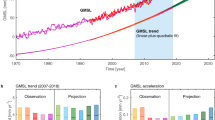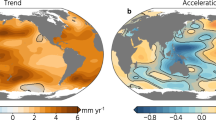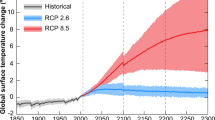Abstract
Two dynamical methods are presently used to project sea-level changes during the next century. The process-based method relies on coupled atmosphere–ocean models to estimate the effects of thermal expansion and on sea-level models combined with certain empirical relationships to determine the influence of land–ice mass changes1,2. The semi-empirical method uses various physically motivated relationships between temperature and sea level, with parameters determined from the data, to project total sea level3,4,5,6,7. However, semi-empirical projections far exceed process-based projections. Here, we test the robustness of semi-empirical projections to the underlying assumptions about the inertial and equilibrium responses of sea level to temperature forcing and the impacts of groundwater depletion and dam retention during the twentieth century. Our results show that these projections are sensitive to the dynamics considered and the terrestrial-water corrections applied. For B1, which is a moderate climate-change scenario1, the lowest semi-empirical projection of sea-level rise over the twenty-first century equals 62±14 cm. The average value is substantially smaller than previously published semi-empirical projections and is therefore closer to the corresponding process-based values. The standard deviation is larger than the uncertainties of process-based estimates.
This is a preview of subscription content, access via your institution
Access options
Subscribe to this journal
Receive 12 print issues and online access
$209.00 per year
only $17.42 per issue
Buy this article
- Purchase on Springer Link
- Instant access to full article PDF
Prices may be subject to local taxes which are calculated during checkout



Similar content being viewed by others
References
Solomon, S. et al. (eds) Climate Change 2007: The Physical Science Basis (Cambridge Univ. Press, 2007).
Slangen, A. B. A., Katsman, C. A., van de Wal, R. S. W., Vermeersen, L. L. A. & Riva, R. E. M. Towards regional projections of twenty-first century sea-level change based on IPCC SRES scenarios. Clim. Dyn. 38, 1191–1209 (2012).
Rahmstorf, S. A semi-empirical approach to projecting future sea-level rise. Science 315, 368–370 (2007).
Von Storch, H., Zorita, E. & Gonzáles-Rouco, J. F. Relationship between global mean sea-level and global mean temperature in a climate simulation of the past millennium. Ocean Dyn. 58, 227–236 (2008).
Vermeer, M. & Rahmstorf, S. Global sea level linked to global temperature. Proc. Natl Acad. Sci. USA 106, 21527–21532 (2009).
Grinsted, A., Moore, J. C. & Jevrejeva, S. Reconstructing sea level from paleo and projected temperatures 200 to 2100 AD. Clim. Dyn. 34, 461–472 (2010).
Rahmstorf, S., Perrette, M. & Vermeer, M. Testing the robustness of semi-empirical sea level projections. Clim. Dyn. 39, 861–875 (2012).
Hansen, J. et al. A closer look at United States and global surface temperature change. J. Geophys. Res. 106, 23947–23963 (2001).
Brohan, P., Kennedy, J. J., Harris, I., Tett, S. F. B. & Jones, P. D. Uncertainty estimates in regional and global observed temperature changes: A new data set from 1850. J. Geophys. Res. 111, D12106 (2006).
Moore, J. C., Grinsted, A. & Jevrejeva, S. New tools for analyzing time series relationships and trends. EOS 86, 226–232 (2005).
Church, J. A. & White, N. J. A 20th century acceleration in global sea-level rise. Geophys. Res. Lett. 33, L01602 (2006).
Church, J. A. & White, N. J. Sea-level rise from the late 19th to the early 21st century. Surv. Geophys. 32, 585–602 (2011).
Jevrejeva, S., Moore, J. C., Grinsted, A. & Woodworth, P. L. Recent global sea level acceleration started over 200 years ago? Geophys. Res. Lett. 33, L08715 (2008).
Chao, B. F., Wu, Y. H. & Li, Y. S. Impact of artificial reservoir water impoundment on global sea level. Science 320, 212–214 (2008).
Konikow, L. F. Contribution of global groundwater depletion since 1900 to sea-level rise. Geophys. Res. Lett. 38, L17401 (2011).
Wada, Y. et al. Past and future contribution of global groundwater depletion to sea-level rise. Geophys. Res. Lett. 39, L09402 (2012).
Pokhrel, Y. N. et al. Model estimates of sea-level change due to anthropogenic impacts on terrestrial water storage. Nature Geosci. 5, 389–392 (2012).
Marčelja, S. The timescale and extent of thermal expansion of the global ocean due to climate change. Ocean Sci. 6, 179–184 (2010).
Raper, S. C. B. & Braithwaite, R. J. Glacier volume response time and its links to climate and topography based on a conceptual model of glacier hypsometry. Cryosphere 3, 183–194 (2009).
Gregory, J. M. et al. Twentieth-century global-mean sea-level rise: is the whole greater than the sum of the parts? J. Clim. http://dx.doi.org/10.1175/JCLI-D-12-00319.1 (2012).
Domingues, C. M. et al. Improved estimates of upper-ocean warming and multi-decadal sea-level rise. Nature 453, 1090–1093 (2008).
Folland, C. K., Parker, D. E. & Kates, F. E. Worldwide marine temperature fluctuations 1856–1981. Nature 310, 670–673 (1984).
Delworth, T. L. & Mann, M. E. Observed and simulated multidecadal variability in the Northern Hemisphere. Clim. Dyn. 16, 661–676 (2000).
Jevrejeva, S., Grinsted, A., Moore, J. C. & Holgate, S. Nonlinear trends and multiyear cycles in sea level records. J. Geophys. Res. 111, C09012 (2006).
Church, J. A. et al. Revisiting the Earth’s sea-level and energy budgets from 1961 to 2008. Geophys. Res. Lett. 38, L18601 (2011).
Price, S. F., Payne, A. J., Howat, I. M. & Smith, B. E. Committed sea-level rise for the next century from Greenland ice sheet dynamics during the past decade. Proc. Natl Acad. Sci. USA 108, 8978–8983 (2011).
Winkelmann, R., Levermann, A., Frieler, K. & Martin, M. A. Uncertainty in future solid ice discharge from Antarctica. Cryosphere Discuss. 6, 673–714 (2012).
Pfeffer, W. T., Harper, J. T. & O’Neal, S. Kinematic constraints on glacier contributions to 21st-century sea-level rise. Science 321, 1340–1343 (2008).
Gasson, E. et al. Exploring uncertainties in the relationship between temperature, ice volume, and sea level over the past 50 million years. Rev. Geophys. 50, RG1005 (2012).
Acknowledgements
We thank the Croatian Ministry of Science, Education and Sports for support (grant 119-1193086-3085).
Author information
Authors and Affiliations
Contributions
The authors contributed equally to this work.
Corresponding author
Ethics declarations
Competing interests
The authors declare no competing financial interests.
Supplementary information
Rights and permissions
About this article
Cite this article
Orlić, M., Pasarić, Z. Semi-empirical versus process-based sea-level projections for the twenty-first century. Nature Clim Change 3, 735–738 (2013). https://doi.org/10.1038/nclimate1877
Received:
Accepted:
Published:
Issue Date:
DOI: https://doi.org/10.1038/nclimate1877
This article is cited by
-
The Adriatic Sea: A Long-Standing Laboratory for Sea Level Studies
Pure and Applied Geophysics (2017)



